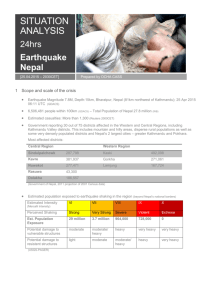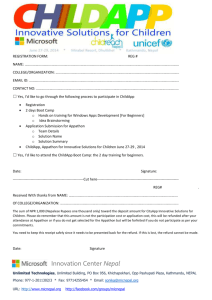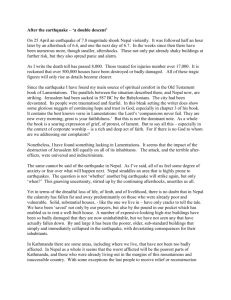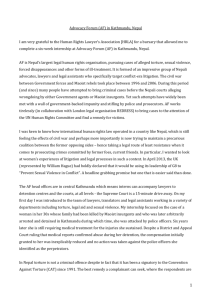ANNUAL PROGRESS REPORT IN CHRONOLOGICAL ORDER
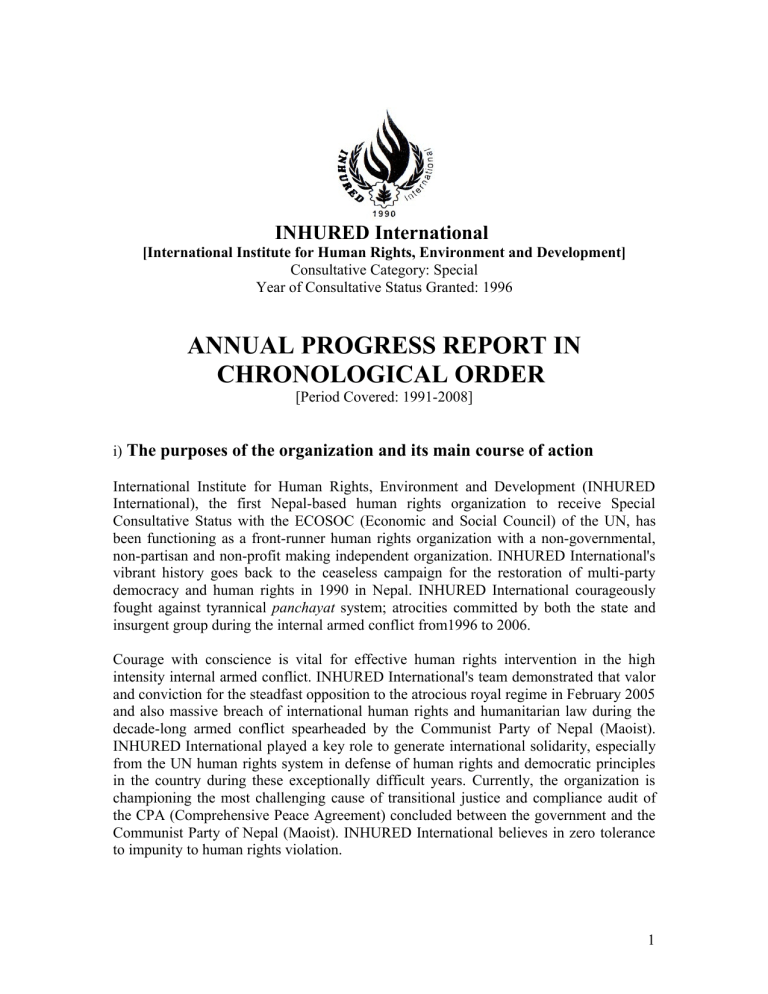
INHURED International
[International Institute for Human Rights, Environment and Development]
Consultative Category: Special
Year of Consultative Status Granted: 1996
ANNUAL PROGRESS REPORT IN
CHRONOLOGICAL ORDER
[Period Covered: 1991-2008] i)
The purposes of the organization and its main course of action
International Institute for Human Rights, Environment and Development (INHURED
International), the first Nepal-based human rights organization to receive Special
Consultative Status with the ECOSOC (Economic and Social Council) of the UN, has been functioning as a front-runner human rights organization with a non-governmental, non-partisan and non-profit making independent organization. INHURED International's vibrant history goes back to the ceaseless campaign for the restoration of multi-party democracy and human rights in 1990 in Nepal. INHURED International courageously fought against tyrannical panchayat system; atrocities committed by both the state and insurgent group during the internal armed conflict from1996 to 2006.
Courage with conscience is vital for effective human rights intervention in the high intensity internal armed conflict. INHURED International's team demonstrated that valor and conviction for the steadfast opposition to the atrocious royal regime in February 2005 and also massive breach of international human rights and humanitarian law during the decade-long armed conflict spearheaded by the Communist Party of Nepal (Maoist).
INHURED International played a key role to generate international solidarity, especially from the UN human rights system in defense of human rights and democratic principles in the country during these exceptionally difficult years. Currently, the organization is championing the most challenging cause of transitional justice and compliance audit of the CPA (Comprehensive Peace Agreement) concluded between the government and the
Communist Party of Nepal (Maoist). INHURED International believes in zero tolerance to impunity to human rights violation.
1
The officials' composition of the organization include: lawyers, youths, gender experts, peace educators, anthropologists, human rights defenders and researchers with a geographical coverage of global advocacy through UN human rights protection mechanisms with special focus on South Asia region with regular programs in Nepal. Its major objectives are: the advancement of human rights, transitional justice, universal suffrage, and freedom of elections, democratic development, just peace, accountability and good governance. The Guiding Principle of the organizations is “International
Solidarity for Human Rights and Human Dignity”. Its modes operandi includes research, education, training, civic diplomacy, fact-finding, documentation, dissemination of information, publication, litigation and legal assistance.
ii.
Any change that may have had a significant impact on the organization vision and/or functions
During the internal armed conflict period, the organization underwent a major change in its scope and jurisdiction on human rights monitoring system. As the country (Nepal), where its Headquarters is located, witnessed and encountered the massive violation of international human rights and humanitarian law during the course of high intensity internal armed conflict spearheaded by the Communist Party of Nepal (Maoist), the major focus of the organization was safeguarding the non-derogable civil and political rights rather than economic, social and cultural rights particularly during the state of emergency imposed by the king in February 1, 2005. During these critical years, monitoring the peace process became another vital challenge and opportunity for the organization. Thus, the organization primarily devoted itself in fact-finding, monitoring and reporting on the violation of the Geneva Conventions with ‘do harm approach’. In sum, it had to work under exceptionally difficult circumstances during the armed conflict and the historical ‘Peoples Movement”-in April 2006. Towards the end of the reporting period, there was a major shift in the scope of the organization as it entirely devoted to the monitoring of the CPA (Comprehensive Peace Agreement) in combination with the pre-monitoring of the historical election of the Constituent Assembly in Nepal.
iii)
Participation in the work of the Economic and Social Council and its subsidiary bodies and/or major conferences and other UN meetings
INHURED International upholds the human rights doctrines adopted by the UN along with the UN Charter for safeguarding democracy, peace and human rights worldwide. It unconditionally embraces the universality, indivisibility and interdependence of human rights as endorsed by the UN Second World Conference on Human Rights held in
Vienna, Austria in June 1993 and strives for effective realization of all international instruments adopted by the UN at regional and domestic level. The following are some of the examples of the involvement of the organizations in various activities around the
ECOSOC, its subsidiary bodies and the major UN sponsored events on human rights, peace and sustainable development:
2
INHURED International upholds the human rights doctrines adopted by the UN. In addition to upholding to the UN Charter, it embraces universality, indivisibility and interdependence of human rights as endorsed by the UN Second World Conference on
Human Rights held in Vienna, Austria in June 1993 and strives for effective realization of international human rights instruments adopted by the UN at regional and domestic level. NHURED International coordinated the NGO activities in the Asia-Pacific during the UN Second World Conference on Human Rights and the Asia-Pacific Conference in preparation for the same.
iv)
Some Examples of Activities since 1991-1999
• Organized the First International Conference on Human Rights Law-Making,
Transition to Democracy, 1991 Kathmandu
• Organized with other co-organizers the Asia-Pacific NGO Conference on Human
Rights, March 1993, Bangkok, including several follow-up events in preparation for the UN World Conference on Human Rights, 1993 Vienna
• Initiated and organized Public Hearing on the Impacts of the Policies of
International Financial Institutions in Vienna at the outset of the UN World
Conference on Human Rights, 1993, Vienna
• Coordinated the preparatory process and the representation of NGOs from Nepal in the UN Fourth World Conference on Women, 1995 Beijing
• Organised a regional workshop on "Combating Trafficking-in Women" in 1997
Kathmandu
• Organized Mini Beijing Conference on Women in 1997, Kathmandu
• Organized the 2 nd International Women and Water Conference in 1998,
Kathmandu
• Hosted Secretariat for National Election Observation Committee's Secretariat in
1999, Kathmandu v)
Examples of involvement of the organization in various activities around ECOSOC, its subsidiary bodies & major UN-sponsored events.
• Throughout 2000 to 2003, the organization convened, some times alone and often in collaboration with other organizations, side events during the UN Commission on the Status of Women (CSW) in the UN Headquarters in New York to raise the civil society voice on gender justice and women’s human rights to the main official events.
• The President of the organization was invited as an observer at the seminar titled
“Application of Humanitarian Law in Domestic Context” by ICRC (International
Committee of the Red Cross) and the UN High Commissioner for Refugees
(UNHCR) at Harvard University, Boston, Massachusetts from 26 to 30 June
2003.
3
• On 14-20 May 2001, the sizable delegation from the organization participated in the UN Third Conference on Least Developed Countries (LDC-III) in Brussels,
Belgium organized by UNCTAD (UN Conference on Trade and Development) and participated in the NGO parallel session on development agenda in which the then UN Secretary General Mr. Kofi Annan attended as a Key Note Speaker.
• The President of the organization participated as an NGO delegate in the
Preparatory Committee (PrepCom) meeting on the UNGASS (UN General
Assembly Special Session) on Children organized in the UN Headquarters in New
York from 8 to11 June, 2001.
• From 28 August to 2 September 2000, the President of the organization presented a working paper on “Impact of Armed Conflict on Children” in a Conference organized by the Canadian government in Winnipeg in partnership with the office of the then UN Under-Secretary General on Children and Armed Conflict Mr.
Olara Ottunu.
• The President of the organization was invited as a delegate at the Millennium
NGO Forum, UN Headquarters, New York from 22 to 26 May 2000 prior to the
Beijing+ Five Conference organized by the Commission on the Status of Women in which three delegates from the organizations participated.
vi)
Cooperation with United Nations bodies and/or specialized agencies in the field and/or at Headquarters.
• On 16-18 May, 2000, the organization presented a working paper on “Impact of
Armed Conflict on Children” in the “Asia-Pacific Conference on Child
Soldiering” organized by UNICEF, Coalition to Stop the Use of Child Soldiers and the Government of Nepal
• On 8-10 May, 2002, the organization participated in the UN General Assembly
(GA) Special Session on Children, New York and contributed to the draft
Program of Action called “A World Fit for Children”.
• Throughout 2000 to 2003, the organization worked in close cooperation with UN
High Commissioner for Refugees (UNHCR) towards exploring durable solution to the Bhutanese, refuges from Tibet Autonomous Region of China and urban refugees who are living in Nepal for the last several decades.
• Throughout 2000 to 2003, the organization worked in close cooperation with UN
Centre for Human Rights in Geneva and the Office of the High Commissioner for
Human Rights during the various sessions of the UN Commission on Human
Rights and its Sub-Commission Sessions held in Geneva and made oral and written interventions on the issues relating to gender, refugees, extra-judicial
4
killings, minorities, dalit, disappearance, torture, impunity and violation of fundamental freedoms including freedom of expression.
• Throughout 2000 to 2003, the organization participated in the UNESCO (UN
Educational, Scientific and Cultural Organization) Board of Directors meeting of
Human Rights Institutions in Paris, France and contributed to highlight the status of human rights education in South Asia region for policy change on education system.
• Throughout 2000 to 2003, the organization got involved in writing and presenting Nepal's initial NGO shadow reports on UN human rights instruments namely, ICCPR (International Covenant on Civil and Political Rights), CEDAW
(Convention on the Elimination of All forms of Discrimination Against Women) and CRC (Convention on the Rights of the Child).
• Throughout 2000 to 2003, the organization engaged in conducting training on international humanitarian law, counter-trafficking and migration management,
UN human rights system, UN reform agenda and human rights monitoring and reporting system both at national and regional levels with concerned stakeholders, including the local UN agencies and their implementing partners. vii)
Activities in line with the Millennium Development Goals (MDGs)
The organization contributed to the attainment of the MDGs in the following manner:
• As one of the major international instruments governing the MDGs, the organization prepared the alternative report in collaboration with HRTMCC
(Human Rights Treaty Monitoring Coordination Committee) on the ICESCR
(International Covenant on Economic Social and Cultural Rights) to the concerned UN Treaty Monitoring Body and intervened during the consideration in Geneva on 18 August 2002.
• In order to enhance campaign under Ensuring Environmental
Sustainability, the organization participated in the UN Conference on Sustainable
Development held in Johannesburg from 26 August to 5 September, 2002 as a delegate of the civil society and participated in the environment and water rights conference at Water Dome as a key parallel activity of the main event.
• In the entire years of 2002-3, to enhance the MDG Goal 2 by achieving Universal
Primary Education, the organization translated and produced “Education for All
(EFA)” and also distributed throughout Nepal with the assistance from UNESCO
(UN Educational, Scientific and Cultural Organization), Paris, France.
5
• To advance the campaign on Beijing Platform for Action (BPFA) in corroboration with MDG 3 on Gender Equality , the organization participated in the Beijing+ 5, in New York from 30 May to 9 June, 2000 and produced series of reports
Beijing Platform for Action, including CEDAW Alternative Report in partnership with Beyond Beijing Committee (BBC) for lobbying and advocacy campaign.
• Throughout September 2005, the organization participated in the global activities around the MDGs during the MDG+Five Summit, September 2005 in collaboration with GCAP (Global Action against Poverty); UN Millennium
Campaign and Action Aid International.
• The organization convened a major national event in Kathmandu on the occasion of the 58 th International Human Rights Day on 10 December, 2005 in which Mr.
Salil Shetty, UN Millennium Campaign Director was the international chief guest.
• To advance the campaign on Beijing Platform for Action (BPFA) in corroboration with MDG 3 on Gender Equality , the organization, at the auspicious of the UN
ESCAP (Economic and Social Council for the Asia-Pacific), participated in the
Beijing+10 in Bangkok, Thailand from 22-25 August 2004 and produced series of reports on the condition of women and Nepal and South Asia in partnership with
Beyond Beijing Committee (BBC).
viii)
Involvement in Other Key activities
• Throughout 2000 to 2003, the organization has convened, some times alone and often in collaboration with other organization, side events during the UN
Commission on the Status of Women (CSW) in the UN Headquarters in New
York to raise the civil society voice on gender justice to the main official forums.
• From 29 August to 2 September 2004, the President of the organization presented a working paper on the “Demand side of Human Trafficking” at the Yokohama+5
Mid-Term Review organized by UNICEF (UN Fund for Children) and ILO
(International Labor Organization) as a joint initiative in Colombo, Sri Lanka.
• The organization attended the Interactive Hearing on UN Reform’s central agenda
“ In Larger Freedom …..”, 21-22 June, 2005 in New York at the invitation of the then President of the UN GA as a UN-civil society partnership initiative. The
President and a senior staff of the organization attended the event.
• On 13-15 September, 2006, the President of the organization attended the High
Level Dialogue on Migration and Development organized by IOM (International
Organization for Migration) during the UN GA at the UN Headquarters and worked in close cooperation with IOM and UN NGLS (Non-Governmental
Liaison Service).
6
• The President of the organization was invited as an NGO (Non-Governmental
Organization) delegate at the UN sponsored Millennium Development Goals
(MDG)+Five event as a part of the UN General Assembly (GA) on 14-16
September 2005 in New York.
• The President of the organization was designated as an official representative by the Government of Nepal at the UN GA on the Conference on Small Arms and
Light Weapons from 26 June-11 July 2006 at the UN Headquarters.
• On 15 September 2006, the UN-OHRLLS (Office of the High Representative for the Least Developed Countries, Landlocked Developing Countries and Small
Island Developing States) invited the President of the organization as a Panelist on LDCs (Least Developed Countries) Parliamentarians Conference as a part of the GA at the UN Headquarters.
• The President of the organization represented in the Commission on the Status of
Women in New York on 24 February to 8 March, 2007 and was invited by the
Open Society Institute for a special lecture on women in conflict on 28 February to mark one of the major side events.
• Throughout 2005-2008, the organization coordinated the monitoring of the CPA
(Comprehensive Peace Agreement) in coordination with UNMIN (UN Mission in
Nepal) to advance the delicate peace process to a logical conclusion.
• Throughout 2005-2008, the organization produced the following materials to uphold the UN principles on human rights and peace:
• From October to December 2006, upon the request of the UNICEF (UN Fund for
Children), the organization provided expertise to UNICEF Country Office in
Nepal to prepare a National Review Report on "A World Fit for Children ” covering the period 2002-2006 to be submitted to the UN GA.
• From 2005 to 2008, the organization actively participated to the joint activities with OHCHR (UN High Commissioner for Human Rights) field office in Nepal to monitor the gross violation of human rights and humanitarian law during the high intensity internal armed conflict.
• In the entire month of February 2005 the organization served as a partner to ILO
(International Labor Organization) Country Office in Nepal on research, manual preparation and training on safe migration and counter-trafficking initiative.
• From 2005 to 2008, the organization worked in close cooperation with UN High
Commissioner for Refugees (UNHCR) towards exploring durable solution to the
Bhutanese refuges and refugees from the Tibet Autonomous Region of China and urban refugees who are living in Nepal.
7
• From 2005 to 2008, the organization worked in close cooperation with UN Centre for Human Rights in Geneva during the various sessions of the UN Commission on Human Rights and later at the Human Rights Council held in Geneva and made oral and written intervention on the issues relating to refugees, torture, impunity and violation of non-derogable rights.
• From 2005 to 2008 every year, the organization worked in cooperation with the
UNESCO (UN Educational, Scientific and Cultural Organization) Board of
Directors of the Human Rights Institutions in Paris, France and contributed to amplify the status of human rights education in South Asia region.
• From 2005 to 2008, the organization engaged in preparing Nepal's NGO shadow reports on ICCPR (International Covenant on Civil and Political Rights);
CEDAW (Convention on the Elimination of All forms of Discrimination Against
Women); and CRC (Convention on the Rights of the Child) in coordination with
UNICEF and other relevant UN agencies. ix)
Activities in Support of Global Principles
• Throughout 2000-2008, the various UN and International Day(s) such as children, migration, women, labor etc. were observed by organizing seminars in participation with the UNDP (UN Development Program) Resident
Representative and other senior UN officials as special guests of the events.
• Throughout 2000-2008, the International Women’s Day was observed each 8 th
March by the organization in collaboration with other like-minded institutions.
The organization has participated in the rallies and public meeting on the occasion of each Woman’s Day in Kathmandu and sometimes at international level too.
• The organization translated the Universal Declaration of Human Rights (UDHR) in local languages and each year, the UDHR has been celebrated with the distinct themes adopted by the UN. Rallies, posters, public gathering, seminars and symposiums were organized during the reporting period often as a week-long event.
• Throughout 2000 to 2008, the various UN and International Day(s) such as labor, migration, women, children AIDS etc.) were observed by organizing seminars and workshops in participation with the UNDP (UN Development Program)
Resident Representative(s) and senior UN officials.
• The reporting obligation part of the blue book on “Human Rights: Compilation of
International Human Rights Instruments” published by the UN Centre for Human
Rights in Geneva, has been published in Nepali by the organization and has been widely distributed nationwide for public education and greater human rights awareness. Similarly, a National Human Rights Victims Forum has been
8
organized by the organization on 26-28 December 2007 to mark the eve of the
UDHR’s 60 th Anniversary.
9

